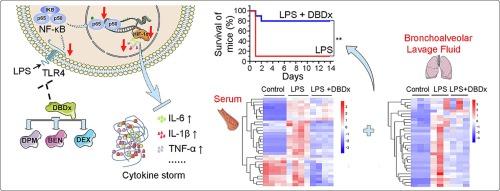The triple combination DBDx alleviates cytokine storm and related lung injury
IF 4.8
2区 医学
Q2 IMMUNOLOGY
引用次数: 0
Abstract
Cytokine storm is a life-threatening disorder, and therapeutic treatments are urgently needed. Here, we investigated the anti-cytokine storm efficacy of DBDx, a triple drug combination composed of dipyridamole, ubenimex and dexamethasone. Evaluated by lipopolysaccharide (LPS)-induced cytokine storm murine model, DBDx significantly improved survival rate and prolonged survival time of the model mice. Notably, the efficacy of DBDx was higher than that of dipyridamole, ubenimex and dexamethasone. Determined by ELISA, DBDx significantly reduced the LPS-stimulated serum levels of TNF-α, IL-6 and IL-1β in mice. Luminex assay showed that DBDx suppressed the serum levels of a wide variety of inflammatory cytokines and chemokines, which was more potent than dexamethasone alone. Otherwise, DBDx exerted similar inhibitory effects on cytokine profiles in bronchoalveolar lavage fluid. Histopathological observation showed that DBDx significantly reduced the LPS-induced thickening of alveolar septum, indicating its suppression of capillary congestion, edema and neutrophil infiltration in the lung. Ultra-structure analysis showed that DBDx suppressed the LPS-induced morphological changes of microvilli in type II pneumocytes. In vitro experiment showed that DBDx inhibited IL-6 and TNF-α secretion in THP-1 cells, and downregulated TLR4/NF-κB/HIF-1α signaling pathway. All of these results demonstrate that DBDx, a triple combination of clinical orally-administered drugs, can alleviate cytokine storm and related lung injury. DBDx is beneficial for treating cytokine storm disorders.

三重组合 DBDx 可减轻细胞因子风暴和相关的肺损伤。
细胞因子风暴是一种危及生命的疾病,急需治疗方法。在此,我们研究了由双嘧达莫、乌苯美司和地塞米松组成的三联药物组合 DBDx 抗细胞因子风暴的疗效。通过脂多糖(LPS)诱导的细胞因子风暴小鼠模型评估,DBDx显著提高了模型小鼠的存活率并延长了存活时间。值得注意的是,DBDx 的疗效高于双嘧达莫、乌苯美司和地塞米松。通过酶联免疫吸附法测定,DBDx 能显著降低 LPS 刺激的小鼠血清中 TNF-α、IL-6 和 IL-1β 的水平。Luminex 检测表明,DBDx 可抑制血清中多种炎性细胞因子和趋化因子的水平,其作用比单用地塞米松更强。此外,DBDx 对支气管肺泡灌洗液中的细胞因子谱也有类似的抑制作用。组织病理学观察显示,DBDx 能显著减少 LPS 诱导的肺泡间隔增厚,表明它能抑制肺部毛细血管充血、水肿和中性粒细胞浸润。超微结构分析表明,DBDx 可抑制 LPS 诱导的 II 型肺细胞微绒毛形态变化。体外实验表明,DBDx 可抑制 THP-1 细胞中 IL-6 和 TNF-α 的分泌,并下调 TLR4/NF-κB/HIF-1α 信号通路。所有这些结果表明,DBDx 是一种三联临床口服药物,可以缓解细胞因子风暴和相关的肺损伤。DBDx有利于治疗细胞因子风暴疾病。
本文章由计算机程序翻译,如有差异,请以英文原文为准。
求助全文
约1分钟内获得全文
求助全文
来源期刊
CiteScore
8.40
自引率
3.60%
发文量
935
审稿时长
53 days
期刊介绍:
International Immunopharmacology is the primary vehicle for the publication of original research papers pertinent to the overlapping areas of immunology, pharmacology, cytokine biology, immunotherapy, immunopathology and immunotoxicology. Review articles that encompass these subjects are also welcome.
The subject material appropriate for submission includes:
• Clinical studies employing immunotherapy of any type including the use of: bacterial and chemical agents; thymic hormones, interferon, lymphokines, etc., in transplantation and diseases such as cancer, immunodeficiency, chronic infection and allergic, inflammatory or autoimmune disorders.
• Studies on the mechanisms of action of these agents for specific parameters of immune competence as well as the overall clinical state.
• Pre-clinical animal studies and in vitro studies on mechanisms of action with immunopotentiators, immunomodulators, immunoadjuvants and other pharmacological agents active on cells participating in immune or allergic responses.
• Pharmacological compounds, microbial products and toxicological agents that affect the lymphoid system, and their mechanisms of action.
• Agents that activate genes or modify transcription and translation within the immune response.
• Substances activated, generated, or released through immunologic or related pathways that are pharmacologically active.
• Production, function and regulation of cytokines and their receptors.
• Classical pharmacological studies on the effects of chemokines and bioactive factors released during immunological reactions.

 求助内容:
求助内容: 应助结果提醒方式:
应助结果提醒方式:


